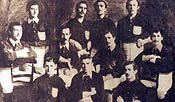- William McCrum
William McCrum was a wealthy Irish
linen manufacturer and sportsman, most famous for being the inventor in 1890 of thepenalty kick in football.Life and family
William was the son of the linen millionaire Robert Garmany McCrum who was the builder of the
Victorian era model village of Milford andHigh Sheriff forCounty Armagh . He studied atThe Royal School, Armagh and thenTrinity College, Dublin and later worked for the family business including a time as London representative and one of the managing directors of linen manufacturers McCrum, Watson and Merver. William was not a success at running the family business and had to sell the Milford mill in 1931.When not travelling the world he spent a large proportion of his life living in Milford where he was a
Justice of the Peace and representative of many sporting clubs and committees including Milford Football Club, Milford and ArmaghCricket Clubs, and [http://www.armaghrfc.com Armagh Rugby Football Club] . He also played chess for Armagh and participated in individual and team competitions and also submitted games. [ [http://homeofthepenaltykick.com/index.php?option=com_content&task=view&id=18&Itemid=34 Home of the penaltykick William McCrum profile] ] [ [http://www.rct26.dial.pipex.com/timetraveller/tt0103_ulster1893.htm The 1893 Ulster Championship - William McCrum v R.T. Roth annotated by William McCrum] ]
thumb|right|Milford Everton FC.William McCrum is on the middle row second from the leftHe played for many years as goalkeeper for Milford Everton FC including in the first season of the
Irish Football League (1890-1891). Milford finished bottom of the league with 0 points from 14 games, having conceded 62 goals and scored only 10, and were relegated.'Master Willie' as he was known to the villagers also spent his spare time taking part in amateur theatrics in the Milford
village hall , called the McCrum Institute. He died after a long illness in December 1932 in an Armagh boarding house. The McCrum family home in Milford, "Manor House" became a Special Care Hospital, but is now derelict. [ [http://www.bbc.co.uk/legacies/heritage/northern_ireland/har/article_1.shtml Legacies, Heritage at Risk in Northern Ireland, County Armagh - Manor House Special Care Hospital, Milford(BBC)] ]British writer and former literary editor of "
The Observer "Robert McCrum , is his grandson, and wrote about William McCrum "Shut out of the family business as a lightweight, eventually deserted by a faithless wife and coldly ignored by his father, Master Willie travelled the world, lived high on the hog and was well-known as a gambler." [ [http://www.guardian.co.uk/football/2004/jul/04/euro2004.sport9 Penalty Shootouts? Blame my grandfather] , The Observer, Sunday July 4 2004] Another grandson Mark McCrum, an English journalist and travel writer, made references to William McCrum in his book "The Craic - A Journey through Ireland" [ [http://www.newryjournal.co.uk/content/view/1279/36/ The Craic review The Newry Journal] ] [ [http://www.markmccrum.com/pages/books/the_craic.htm Mark McCrum offical website] ]A memorial is due to be built in Milford to commemorate him. [cite news
author=
title=NI village remembers penalty inventor
date=2007-04-04
work=BBC News
url=http://news.bbc.co.uk/2/hi/uk_news/northern_ireland/6525461.stm
accessdate=2008-08-09]The Penalty Kick
It was in his role as member of the
Irish Football Association that McCrum proposed the idea of the penalty kick in order to stop the prevalent practice at the time of defenders professionally fouling an attacking player in order to stop a goal. The idea was submitted to the June 1890 meeting of theInternational Football Association Board by the Irish FA's general secretary and IFAB representative Jack Reid.The original proposal read: "If any player shall intentionally trip or hold an opposing player, or deliberately handle the ball within twelve
yard s from his own goal line, the referee shall, on appeal, award the opposing side a penalty kick, to be taken from any point 12 yards from the goal line, under the following conditions: All players, with the exception of the player taking the penalty kick and the goalkeeper, shall stand behind the ball and at least six yards from it; the ball shall be in play when the kick is taken. A goal may be scored from a penalty kick."The proposal initially generated much derision and indignation amongst footballers and the press as the 'Irishman's motion' or the 'death penalty' as it was known, conceded that players might deliberately act unsportingly. This went against the Victorian idea of the amateur
gentleman sportsman. Public opinion may have changed after anFA Cup quarter final betweenStoke City andNotts County on14 February 1891 where anindirect free kick after a deliberate handball on thegoal line did not result in a goal.The penalty kick rule was approved as number 13 in the
Laws of the Game , a year after it was proposed, on the2 June 1891 , at the Alexandra Hotel inGlasgow 'after considerable discussion' and with changes affecting where thegoalkeeper and other players could legally stand.In 1998
Gary Lineker made a documentary for theBBC on William McCrum and the penalty kick.References
* [http://www.fifa.ch/en/print/article/0,4039,22688,00.html FIFA]
* [http://www.homeofthepenaltykick.com HOME OF THE PENALTY KICK]
* [http://observer.guardian.co.uk/sport/story/0,6903,1253773,00.html The Guardian]
* [http://www.rsssf.com/tablesn/nilhist.html RSSSF]
* [http://milford.rosa.ie/ ROSA]
*cite book|author=Miller C.|year=1998|title=He Always Puts It To The Right - A History of the Penalty Kick|publisher=Orion|id=ISBN 0-7528-2728-6
Wikimedia Foundation. 2010.
